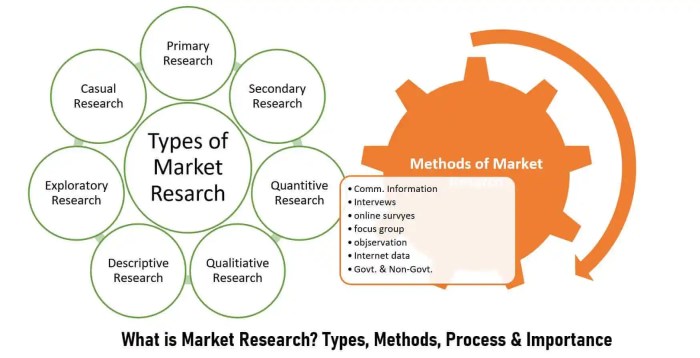Market Research Techniques dive deep into the world of business insights, paving the way for strategic decision-making and industry dominance.
From qualitative to quantitative approaches, these techniques are indispensable tools for companies aiming to stay ahead of the competition.
Market Research Techniques Overview

Market research techniques play a crucial role in the success of businesses by providing valuable insights into consumer behavior, market trends, and competitive landscape. These techniques help organizations make informed decisions based on data-driven analysis rather than guesswork.
Importance of Market Research Techniques in Business
Market research techniques are essential for businesses to understand their target audience, identify market opportunities, and develop effective marketing strategies. By gathering and analyzing data on consumer preferences, buying habits, and competitor activities, companies can tailor their products and services to meet the needs of their customers, leading to increased sales and customer satisfaction.
Role of Market Research Techniques in Decision-Making
Market research techniques provide valuable insights that guide decision-making processes in businesses. By conducting surveys, focus groups, and data analysis, companies can assess market demand, evaluate the performance of existing products, and identify areas for improvement. This information helps businesses make strategic decisions that drive growth and profitability.
Examples of Industries Relying on Market Research Techniques
- The retail industry heavily relies on market research techniques to understand consumer preferences, trends, and buying behavior. Retailers use this information to optimize product offerings, pricing strategies, and promotional campaigns.
- The technology sector utilizes market research techniques to identify market needs, assess competitor offerings, and develop innovative products that meet consumer demands. Companies like Apple and Samsung conduct extensive market research to stay ahead in the competitive tech industry.
- The healthcare industry relies on market research techniques to understand patient needs, evaluate treatment outcomes, and assess the effectiveness of healthcare services. Pharmaceutical companies conduct market research to launch new drugs and treatments that address specific medical conditions.
Qualitative Market Research Techniques

Qualitative market research techniques involve gathering non-numerical data to understand consumer behaviors, motivations, and perceptions. These methods provide insights into the “why” behind consumer actions, allowing companies to make more informed decisions.
Advantages of Qualitative Methods
Qualitative methods offer several advantages in market research. They allow for in-depth exploration of consumer attitudes and emotions, providing a deeper understanding of their needs and preferences. These techniques also enable researchers to uncover new insights that may not be captured through quantitative data alone. Qualitative research helps companies develop more targeted marketing strategies and product innovations based on a comprehensive understanding of their target audience.
- Focus Groups: Focus groups bring together a small group of participants to discuss a specific topic under the guidance of a moderator. This method allows researchers to observe group dynamics, uncover shared opinions, and delve into participants’ thoughts and feelings.
- In-Depth Interviews: In-depth interviews involve one-on-one discussions between a researcher and a participant. This method allows for a detailed exploration of individual experiences, perceptions, and motivations, providing rich and nuanced insights.
- Observations: Observational research involves directly observing consumers in their natural environments. By watching how individuals interact with products or services, researchers can gain valuable insights into behavior patterns, preferences, and unmet needs.
Quantitative Market Research Techniques
Quantitative market research techniques involve the collection and analysis of numerical data to understand trends, patterns, and relationships in the market. This type of research focuses on measurable data points to draw statistical conclusions and make informed decisions.
Comparison of Quantitative and Qualitative Approaches
Quantitative methods differ from qualitative approaches in market research by relying on structured data collection methods, such as surveys, experiments, and data analysis. While qualitative research focuses on understanding the why and how behind consumer behavior through open-ended questions and observations, quantitative research emphasizes numerical data and statistical analysis to uncover trends and patterns.
- Surveys: Surveys involve collecting data from a large sample of respondents through questionnaires. The data collected is then analyzed to draw statistical conclusions about the market trends and consumer preferences.
- Experiments: Experiments are conducted to test hypotheses and measure the impact of variables on consumer behavior. This controlled approach helps in drawing causal relationships and predicting outcomes.
- Data Analysis: Quantitative data analysis involves using statistical tools and software to analyze large datasets and identify patterns, correlations, and trends in the market. This helps in making data-driven decisions and predictions.
Online Market Research Techniques
The digital age has revolutionized market research techniques, shifting a significant portion of the process online. This shift has opened up new opportunities and avenues for businesses to gather valuable insights and data from their target audience in a more efficient and cost-effective manner.
Evolution of Online Market Research, Market Research Techniques
- Online market research has evolved from traditional methods like phone surveys and focus groups to using advanced digital tools and platforms.
- Businesses can now leverage the power of the internet to reach a larger and more diverse audience, allowing for more comprehensive data collection.
- The rise of social media and online communities has provided a wealth of real-time data that can be analyzed to understand consumer behavior and market trends.
Benefits of Conducting Market Research Online
- Cost-effective: Online market research is often more affordable than traditional methods, saving businesses time and money.
- Speed: Data collection and analysis can be done quickly online, providing businesses with timely insights to make informed decisions.
- Global Reach: Online research allows businesses to reach a global audience, breaking down geographical barriers and expanding market reach.
Tools and Platforms for Online Market Research
- Social Media Analytics: Platforms like Facebook Insights, Twitter Analytics, and Instagram Insights provide valuable data on consumer sentiment, preferences, and behavior.
- Online Surveys: Tools like SurveyMonkey and Google Forms allow businesses to create and distribute surveys to collect feedback and insights from their target audience.
- Web Analytics: Tools like Google Analytics help businesses track website traffic, user behavior, and engagement, providing valuable insights into customer preferences and online interactions.